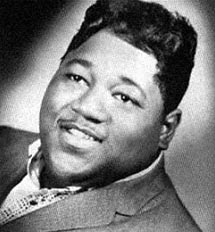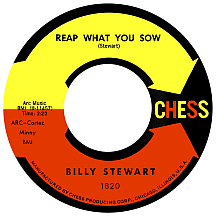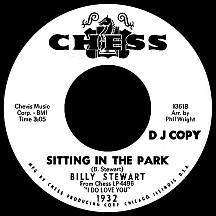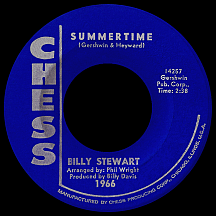BILLY STEWART
At any given time, Billy Stewart would tip the scale at well above three hundred pounds, which led to health problems but also put forth a public image that was hard to ignore; "Fat Boy" became his nickname ("Fat Man" having already been in use for some time by a certain Mr. Domino from New Orleans) while providing the title for one of his better-known songs. Born and raised in the District of Columbia, Billy moved to the midwest in the mid-'50s and ultimately played a role in popularizing the "Chicago Soul" sound of the following decade, though his vocal style bore no resemblance to contemporaries Jerry Butler, Curtis Mayfield or Gene Chandler, among others. His singing was rooted in the jazz and scat styles popular during his childhood; Billy repeated lyrics incessantly (when it came to his own songs, he wrote them with the repetition built-in), stuttering by design and ad-libbing vocal runs with an assertive flair. His records were attention-grabbing and his stage show didn't disappoint.
Growing up singing gospel music in church, by the age of eight, in 1945, he was part of a quartet with siblings Johnny, James and Frank Stewart, collectively known as The Four Stewart Brothers. The group had a radio show on WUST, which aired on Sundays through 1950. As a teenager he embraced secular music, winning a talent show at one point with a jazzed-up rendition of George Gershwin and DuBose Heyward's 1935 Porgy and Bess classic "Summertime," little realizing it would one day become his signature song. A talented piano player, he began getting work backing artists in the D.C. area; Bo Diddley, on a tour stop in 1955, heard him play and hired him for his band. Soon Billy found himself at Chess Records' Chicago studio (where Diddley recorded for the company's Checker imprint); "Billy's Blues," a catchy instrumental with Stewart on piano and cowriter Jody Williams on guitar, had a "Part 2" flip with Billy's vocal, his stuttering technique evident even then. The single was issued on Chess in the spring of 1956 (and a few months later on subsidiary Argo) though airplay and sales never really kicked in.
Diddley's group backed Stewart on his second single, "Billy's Heartache," an Okeh Records release in late 1957; Bo was credited on the label under his real name, Ellas McDaniel, presumably to avoid any problems with Chess. This effort came closest to the trademark Diddley-style beat than any subsequent recordings. Backing vocals were provided by The Marquees, a three-man Diddley discovery that gave future Motown superstar Marvin Gaye his first studio experience (the Marquees' single, "Wyatt Earp," was recorded at the same session). Billy continued performing with Bo's band, later striking out on his own without a record deal, singing and playing in small clubs (in 1961, while he was busy paying his dues, a singer of the teen idol variety named Billy Stewart had one single on United Artists before quickly disappearing).
Billy was interested in returning to Chess, which by that time had employed Roquel "Billy" Davis, a former Detroit producer and songwriter (for Motown and a few other small labels); Davis had freelanced for Chess before becoming a permanent fixture and for Stewart the timing was right (a short, skinny guy, Davis has said he felt he complemented the hefty singer). In January 1962, a strong two-sider was recorded: "Fat Boy," an autobiographical love song of sorts ('...I was her pride and joy...and she was in love-a with-a fat boy...'), and "Reap What You Sow," which set a standard for Stewart's type of tongue-twisting exultation ('Baby, baby, a-baby, a-baby come-a back-a home, wo-o-o-o, o-o-o-o-o-o-oooh...'); backing vocals were provided by the Four Jewels, a girl group from Washington, D.C. that had a hit, "Opportunity," a couple of years later as The Jewels. After several months on the shelf, the single was issued and "Reap" became a top 20 R&B hit and minor pop charter.
Davis got the motormouthed balladeer back into the studio (not always easy to do, as Stewart preferred performing for audiences), emphasizing his organ playing on songs like "True Fine Lovin'" and the instrumental "Scramble" (its staccato note-punching-a-keyboard technique not unlike Stewart's vocal style). Davis encouraged him to write more songs, aware the lyrics almost always had a romantic essence; it wasn't an issue, though, since the real impact was in his singular approach to singing. "Strange Feeling" followed the "Reap What You Sow" template and placed him back on the charts in the fall of '63.
A December 1964 recording session produced two big hits, both Stewart compositions enhanced by male vocal backing (his brother Johnny taking part). "I Do Love You" is an early example of the smooth Chi-soul trend developing at the time, Billy's extra-syllable style running throughout. Going top ten R&B and top 30 pop in May 1965, the chart feat was repeated two months later with "Sitting in the Park," sonically similar but lyrically more somber ('Sitting here on the bench...with my back against the fence...wondering-a if I-I-I...have any sense, girl...'). The era's "overweight lover" unapologetically tailored his music to female fans with "How Nice It Is," the excessively bubbly "Because I Love You" ('I'll follow a rainbow...bring you a pot of gold...la-la-la-la...'), "Mountain of Love" and "Love Me." Yet in 1966, Stewart grew tired of such passion plays and decided to try something a little different.

"Summertime," the classic song he'd performed as a teenager, became the lead track from Unbelievable, an entire album of standards arranged as big band production numbers with Stewart's trademark vocal style going full-throttle. The studio crew had the usual Chess musicians: piano, guitar, bass and drums, plus three trumpeters, three trombonists and three saxophonists! Billy's lyrical twists aren't easy to describe, but his extended tongue-stutter certainly must be one of the most recognizable song intros of all time and his ad-libbed line 'Little darlin' do not let a tear fall-a from your eye-eye-eye-eye-eye...' makes for a spectacular ending. Rules were bent; Davis instructed the session band to follow whatever Billy did, adjust on the fly, make it work! (Seeing it all unfold, he must have thought, "What kind of a monster are we creating?"). Even though the song had been performed on the stage for three decades and in the Academy Award-winning 1959 film starring Sidney Poitier and Dorothy Dandridge, despite its having been a top seller several times (for Billie Holiday in 1936, Sam Cooke in '57 and in 1960s remakes by The Marcels, Rick Nelson and instrumental act The Chris Columbo Quintet), this latest "Summertime" was the hottest version yet, Billy Stewart's biggest hit, a pop and R&B smash, top ten in the heat-scorched month of August 1966. Anyone who's heard it...even just once...has never forgotten it!
The 1954 Doris Day hit "Secret Love" (composed by Sammy Fain and Paul Francis Webster for the film Calamity Jane) was given a treatment similar to "Summertime" and reached the top 30 in November. Afterwards hits were harder to come by, though 1967's "Cross My Heart," with its familiar theme ('This fat boy's gonna love her...place no one up above her...') is a fan favorite. Billy toured regularly with his band The Soul Kings during the late part of the decade as his hits gained (perhaps prematurely) a status as classic "oldies" ("I Do Love You" even made a comeback on the national charts in 1969). Health problems developed; though barely in his thirties, his extreme weight had led to complications with diabetes. An accident involving a motorcyle sidelined him for a time in 1969, but he was back on the road performing by the end of the year.
Billy Stewart's life ended in tragedy when he was just 32 years old; one can speculate on how much longer he might have lived, considering his physical condition, if fate hadn't stepped in to take him much sooner. On the morning of January 17, 1970, while traveling between scheduled shows, a new Ford Thunderbird Billy was driving suddenly locked up and veered off the road into the Neuse River (located near the town of Smithfield in rural North Carolina), causing the deaths of Billy and three members of his band (Norman Rich, William Cathey and Rico Hightower). Others touring with him witnessed the incident from a van following behind. The families of the deceased filed a case against the Ford Motor Company that was eventually settled out of court.
NOTABLE SINGLES:
- Billy's Blues Part 1 /
Billy's Blues Part 2 - 1956 - Billy's Heartache - 1957
- Reap What You Sow /
Fat Boy - 1962 - True Fine Lovin' - 1962
- Scramble - 1963
- Strange Feeling - 1963
- Count Me Out - 1964
- I Do Love You - 1965
- Sitting in the Park - 1965
- How Nice It Is - 1965
- Mountain of Love /
Because I Love You - 1966 - Love Me - 1966
- Summertime - 1966
- Secret Love - 1966
- Every Day I Have the Blues - 1967
- Why Do I Love You So /
Cross My Heart - 1967 - Tell Me the Truth - 1968




